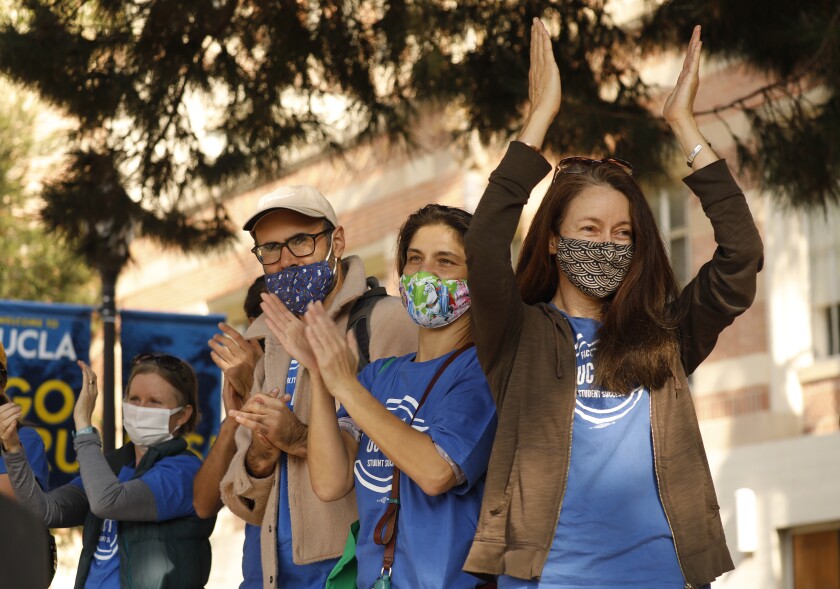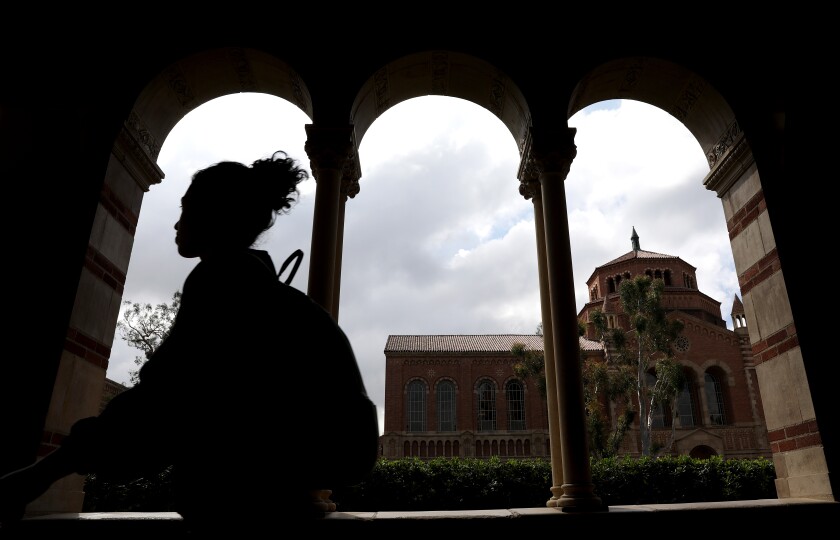The critical role played by University of California lecturers was affirmed Wednesday in a tentative labor agreement that averted a massive strike and widespread class cancellations — instead sparking jubilation over what the union called the ‘best contract’ in its history.
The 6,500 lecturers teach one-third of undergraduate courses and are praised by campus members as indispensable partners who provide instruction, do research and guide students, often spending extra time to help with assignments or write letters of recommendation. But they are non-tenured and had been working without a contract for 20 months as they pressed for better job security, pay increases and family leave benefits.
On Wednesday, after marathon negotiations that ended at 4 a.m., they finally got what they wanted. The agreement provides four weeks of paid family leave at full pay, new rehiring rights that will allow those with good job evaluations to keep their positions and workload requirements that will be more transparent and consistent, according to Mia McIver, president of University Council-AFT.
Lecturers will receive an average 30% pay increase over the five-year contract: a 7% pay increase 60 days after the contract’s ratification and annual salary increases of 3% for the next three years and 4% in the final year. Also included in the increase are merit raises, shifts to a new salary scale and a $1,500 signing bonus to each lecturer on ratification.

UCLA lecturers are brought onstage as they gathered with students at UCLA Bruin Plaza to celebrate Wednesday.
(Al Seib / Los Angeles Times)
“It’s the best contract in UC-AFT history and among the best nationwide for contingent faculty,” McIver said.
UC President Michael V. Drake hailed the agreement and the role lecturers play in remarks Wednesday at the Board of Regents meeting.
“It’s a very positive development for our entire community, especially the students that we serve,” he said. “This contract honors the vital role our lecturers play in supporting UC’s educational mission and delivering high quality instruction and education. It also means more job security and other important benefits for our valued lecturers. We’re grateful to have this agreement in place and look forward to working together in the future on our mission.”
The long-simmering labor dispute had brought union members to the brink of a strike at all nine undergraduate campuses, where hundreds of faculty members had expressed solidarity with lecturers and were prepared to cancel classes. Instead, classes went on, and victory celebrations unfolded — including one at UCLA’s Bruin Plaza. The event kicked off with a performance by UCLA’s student baile folklórico group before a lineup of union representatives addressed the crowd for about 30 minutes.
Randi Weingarten, president of the 1.7 million-member American Federation of Teachers, AFL-CIO, led the crowd in a cheer of “UC-AFT” as rally-goers applauded and munched pizza provided by the union.

A strike was averted, and classes went on Wednesday at UCLA and other campuses.
(Christina House / Los Angeles Times)
Heather Holdo and Sara Barclay, both sophomores, showed up to the rally together. “If you have lecturers that stick with you for a longer amount of time, maybe certain students will be inclined to continue in that area, if they know they have someone they trust and really listen to and look up to,” Barclay said. “Bonds are created.”
That’s exactly what happened with Breeze Velazquez, president of the UCLA Undergraduate Student Assn. Council. She recalled one lecturer during her sophomore year who took extra time to help guide her when she was struggling to decide on an academic path and write a final term paper.
“I was really freaking out,” Velazquez said, “but she sat with me for an hour, and I got an A in the class.”
She added that, as a low-income student, she understood the hardships faced by lecturers who earn a median income of $19,000 annually and work multiple jobs, while trying to teach, research and, for some, raise families.
For Elise Bell, a second-year lecturer of linguistics at UCLA, the greater job stability will help deepen the teaching experience she and her colleagues can bring to students. It will also allow them to know their students better, she said, so they can write letters of recommendation — a personal win at the top of her list.

UCLA Political Science Lecturers Cody Trojan, left, and John Branstetter, right, celebrate with students and lecturers Wednesday morning.
(Al Seib / Los Angeles Times)
“Students are going to benefit from years of experience that lecturers are now going to be able to build up,” she said.
For John Branstetter, a fifth-year UCLA lecturer and president of UC-AFT Los Angeles, Local 1990, the tentative agreement means he can finally sleep — and relax — instead of applying for jobs now that he is finally confident he will be rehired. He said he was up all night waiting for word about a settlement and is thrilled by it.
“It’s a huge win for us as a union. It’s a huge win for me personally,” said Branstetter, who is currently working three jobs. “It literally means I can keep my job — in the five years at UC, I’ve never had to not worry about getting rehired,”
In June, 96% of lecturers voted to authorize a strike after the union filed two unfair labor practice charges. Those charges have been resolved by the tentative agreement.
Access to paid family leave was a top priority for lecturers. UC launched a new policy in July that grants eight weeks of leave at 70% of pay for eligible employees to care for a seriously ill family member or bond with a new child. But most lecturers, the majority of whom teach part time, would not meet the policy’s eligibility requirements to be on the job at least one year and 1,250 hours. UC agreed to extend the benefits to all lecturers for four weeks at full pay.
UC also agreed to increase job stability, a key union demand. Currently, lecturers must work six years before moving into a more senior status with better pay, benefits and security, but the union argued that UC holds them back from achieving that milestone by failing to adequately evaluate them. UC agreed to contracts of one year, two years and three years — with performance reviews at each stage.
“We’ll have feedback as never before,” McIver said. “We think this will really bring stability to the teaching workforce.”
The proposed contract’s new rehiring rights would also mean that a lecturer with good evaluations would not have to reapply for a job each year.
News that the union had finally secured those long-sought rights was bittersweet for Peter Weiss, a lecturer at UC Santa Cruz who learned this year that he would lose a chemistry class he’d taught for 10 years. Weiss estimated that he’s taught about 12,000 students in science, technology and math fields at UC Santa Cruz. His students have launched a change.org petition, with nearly 2,500 signatures so far, asking the chemistry department to keep him on.
“It doesn’t really change anything from me, specifically, because I’ve already been replaced, and my classes have been given to a tenured faculty now,” Weiss said of the proposed contract. “This victory came a little too late for me, but I’m really thrilled to be part of the movement and optimistic that good things will happen for me.”
The lecturers had won wide support for their cause across the UC system. Constance Penley, a UC Santa Barbara professor who serves as president of the Council of UC Faculty Assns., said more than 800 tenure-track faculty members had pledged solidarity with the lecturers, and most of them were prepared to honor the strike by cancelling classes. That show of support by tenured faculty for their lecturer colleagues is unprecedented, she said.
“Lecturers on our campuses are integral to our being able to deliver high-quality education that is a signature of the University of California,” Penley said.
She added that the labor conflicts at UC are being replicated at campuses across the country and sparking a national movement to increase tenured faculty rather than rely on lecturers who lack the same level of pay, benefits or job security.
Stay connected with us on social media platform for instant update click here to join our Twitter, & Facebook
We are now on Telegram. Click here to join our channel (@TechiUpdate) and stay updated with the latest Technology headlines.
For all the latest Education News Click Here
